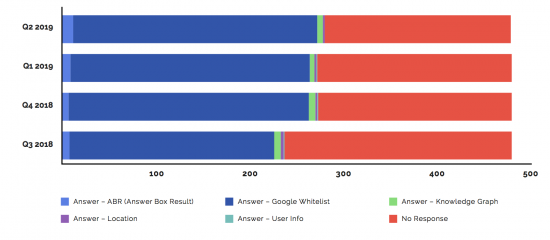Last Updated : 08/01/2020
Page contents
- Introduction
- Voice search performance
- Actions & Skills use cases
- Amazon / Google 1st party
- Existing skills/actions
- Other
- Policy Restrictions
- Main takeways
Introduction to voice in the news & publishing industry
In 2018, there were an estimated 2.5 billion voice assistants in use globally, with Amazon Alexa and the Google Assistant leading the way. By 2023, that number is expected to triple to 8 billion.
We’re now living in a world where voice assistants are taking part in daily conversations. Voice isn’t the future; it’s already here.
With 20% of UK households and over a quarter of US households now owning a smart speaker, we’re leaving the “early adopters” stage behind us, and the news & publishing industries need to pay attention to keep ahead of this new wave of consumer behaviour.
Some companies such as the BBC and The Guardian have been building voice into their marketing strategies for years, but there is still a significant opportunity for other news & publishing companies to carve out a section of the voice market for themselves.
Voice-activated content represents a new frontier for traditional publishers, allowing them to connect to people at any point in their daily routines. Not just at their desk or on their mobile, but while using smart speakers, on the go (e.g. voice-enabled headphones) and in the car.
Key challenges for the news and publishing industry:
- Quality content is widely available online, not just from direct publishers but from aggregators such as Medium.com, resulting in increased competition for the same readership base
- Vast amounts of content need to be digitised and made voice-friendly on an ongoing basis
- Users want access to information in seconds, rather than waiting for a weekly subscription
- The rise in “human-free stories” e.g. The Washington post and LA Times are already using in-house software to create news and social media posts
- Increasing focus on personalisation – people are no longer satisfied to read the same article as a stranger on the street, or even their friends and family
Voice Search Performance
The first step in your voice optimisation strategy should be checking how your website performs for informational queries, e.g. “latest news”, “entertainment news headlines”, etc.
The Google Assistant has recently become slightly better at answering queries about news, with its ability to answer improving from 57% to 59% between Q1 and Q2 2019.
The majority of answers are Google whitelisted results, such as News Playback.

Actions & Skills
Actions (on the Google Assistant) and skills (on Alexa) are voice-enabled apps which extend the built-in functionality of these voice assistants. While optimising your website for voice can provide a one-way snippet of information, actions and skills can allow brands to create two-way conversations with their consumers and can help them to perform tasks and activities.

















